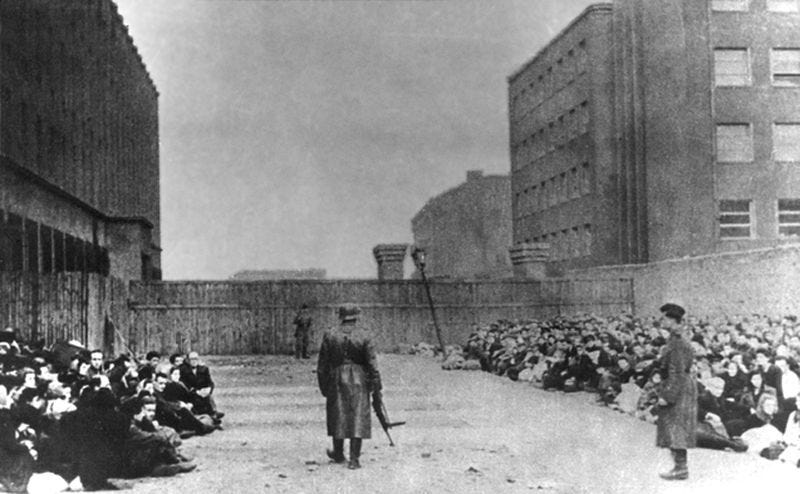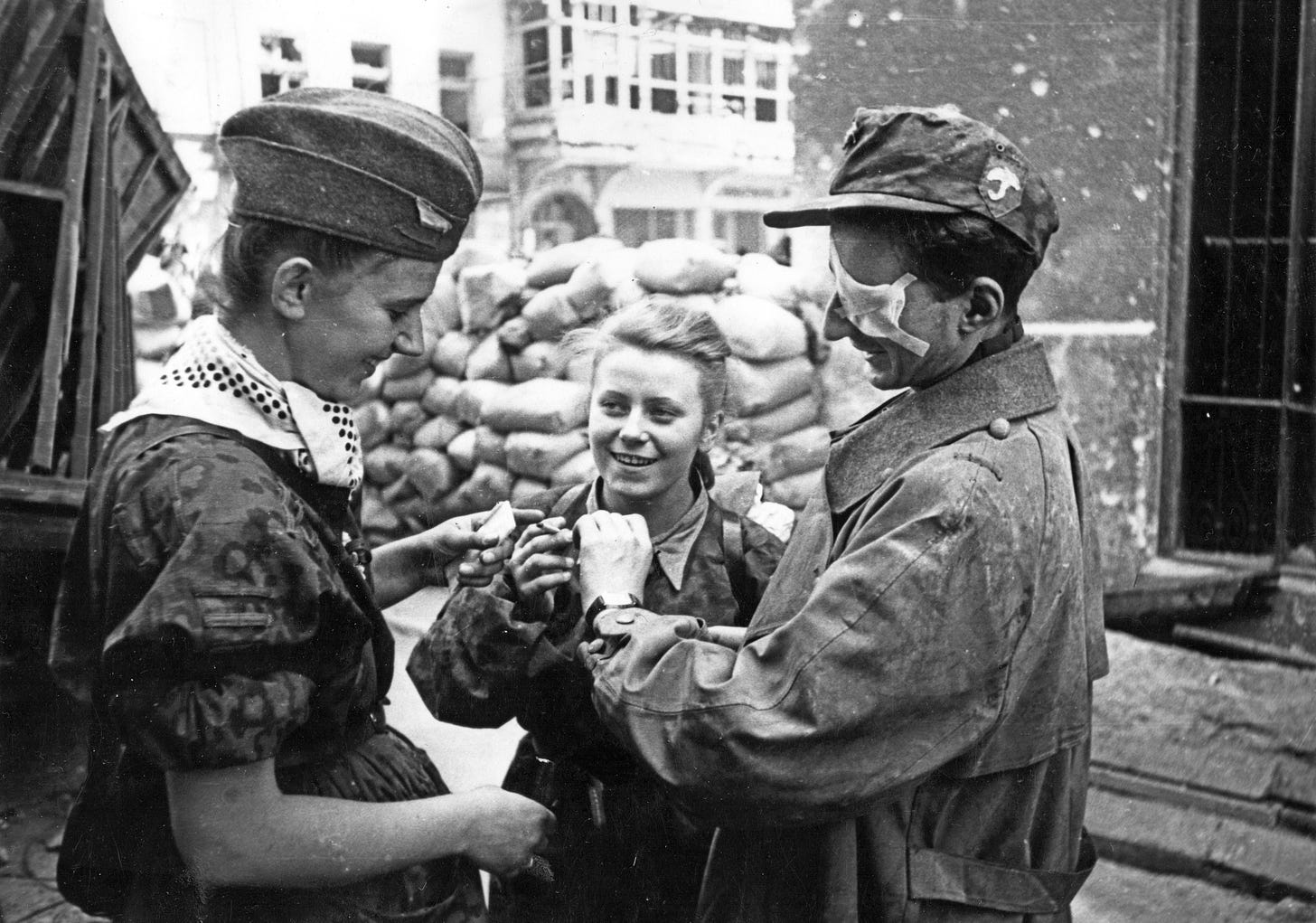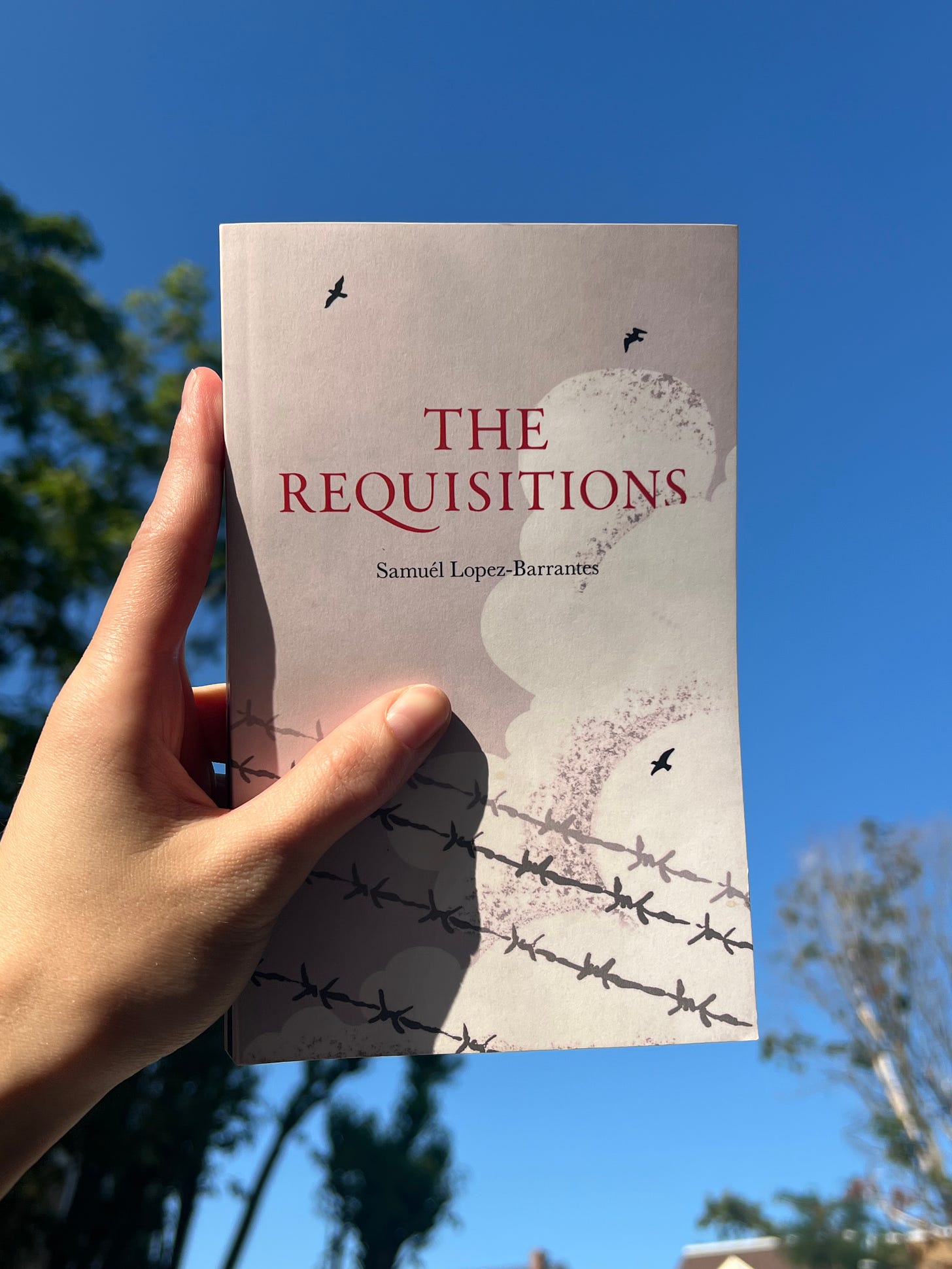“What is the color of forgetting? A cosmic black hole? A blinding white light? Or is it the phantasmagoria of colors we see when we press our palms to our eyelids and keep applying the pressure?”
What is the color of forgetting?
One stark question of many asked by the text of The Requisitions.
Forgetting, I imagine, must be an unassuming grey, a lapse of pigment, a glaring hole in a canvas. To remember is to hold fast to truth even as its defining colors fade, and storytellers paint a world around truth that makes it more resonant and visceral than facts alone.
By way of Matryoshka storytelling— a WWII narrative is framed by the life of the author writing it — Samuél Lopez-Barrantes examines the many different shades of truth and memory. Twisted language, deceptive framing, myth, fable, propaganda, all key players in the story of how and why fascism takes hold of its subjects.
Three characters in three very different positions guide us through Nazi-occupied Poland in the 1940’s: Viktor is a professor, Technically Not Jewish but struggling to evade the Nazis nonetheless; Elsa is an unwilling secretary to an SS-Major, doing her part by being terrible at her job; Carl, Elsa’s estranged cop fiancé, is a policeman being fed drugs and orders by a party whom he follows mostly without question. Each has a different relationship with the occupying beast, confronting the weighted and complicated choices that arise when citizens are swept into a violent genocidal machine.
The heart of the story can be found in quiet acts of hope and rebellion in the face of near-certain destruction.
The Requisitions (2024) by Samuél Lopez-Barrantes
A dark and compelling World War II novel that poses questions about history, truth, and memory by confronting the atrocities of war.
Medium as Message
The clever Matryoshka framing of The Requisitions, the story within a story, is told with the added context of an author researching to put the story of Viktor, Elsa, and Carl to paper. The format allows the text to dig into its themes of myth, truth, and memory more directly than might have been possible with a more straightforward narrative. Lopez-Barrantes pulls us out of the story to remind us that behind every story is a person writing it, and that truth must be retold and repackaged to avoid fading into obscurity.
I won’t repeat a cliché, but you know what they say about those who don’t know history…
Technically Not A Jew, Not That It Matters
Viktor is Technically Not Jewish. Like myself, he had Jewish grandparents that didn’t pass the tradition down. He doesn’t live as a Jew; he doesn’t claim the heritage. But these particulars are not important in wartime. The so-called truth, more than something verifiable and agreed-upon, is a flexible whip wielded by the oppressor that can bend, twist, crack thoughts to form.
It was never about the Truth, it was about feeling the power of cracking a whip against skin and calling it a kiss.
“He might not be religious, Miss Dietrich, but he is a Mischling nonetheless.”

There is power to be found in directly stating the truth of things, and those who mince words often have something to hide. Soldiers are “shuttling Poles to a safer area,” not to extermination camps; they are “enforcing curfew,” not restricting Poles’ right to move about their own city; they are “pacifying,” not executing; they are suppressing Untermensch, not human beings.
In our world of thoughtforms, language shapes reality, and by using clever tricks of the tongue the people in power may doublespeak their people into subordinates and subordinates into docile puppets.
“Would it matter if we learned the precise number of people who spoke of President Rumkowski as ‘King Chaim’ versus ‘Chaim the Terrible?’ Both names speak to truths and falsehoods. To reject either transforms history into a fable.”
How much of this actually happened? Was there really a Nazi secretary that secretly sabotaged her boss? Does it matter? Truth and its omission are both worthy of examination in The Requisition due to the purposes they serve. There are a thousand ways to tell every story. There are a hundred little lies that live within every broad-stroked truth.
Lopez-Barrantes uses these stylized strikethroughs both in the novel and in his Substack writing — a signature of his writing voice, to be sure — what a charming and unique way to insert relevant asides that don’t quite fit naturally but are itching to be included.
The Color of Resistance
War is so much larger than any one person. It is vested interests, it is committees, it is profit and party, it is closed-door meetings. But while war is larger than any one person, there are many individuals with hands on the steering wheel, guiding the ship toward progress or ruin.
This story fearlessly engages with the complexity of resistance — in the wake of industrial-scale violence, some may quietly place a gloved hand on the wheel and tug gently with the knowledge that enough resistance can change the trajectory of the moving machine.
The most beautiful glowing parts of humanity are revealed in how we rise to care for each other in the face of oppression and certain doom. We persist in spite of it all because it is our only option. We move forward arm in arm because we are loving creatures hellbent on survival.

Read this book if…
You think every WWII story has already been written
You want to try historical fiction but worry they read like an Oscar-bait movie that everyone will forget about in 5 years (…requesting more histfic recommendations in the comments, this contemporary girl has been converted)
Don’t read this book if…
You would not steal bread to feed your family
You want to escape from the present reality of genocide into a relaxing book that is not also about genocide
Thanks for reading!
Bitch Sensei’s Book Club meets on the third Monday of every month. In the interim, you can find more prose & essays on my notepad. Add me on StoryGraph to keep up with what I’m reading, & don’t forget to subscribe so you never miss a post. x
Till next time,
BS





Wow, thank you. Looking forward to our real-life human-voice chat. I suspect I have a lot to learn from you yet.
Also re: histfic recommendations, I purposefully avoided reading too much in the genre lest I start copying too many tropes, BUT HHhH (Laurent Binet), a historical metafiction, is kind of the book that gave me permission to write *The Requisitions* the way I did
This was so fabulous thank you for taking so much time and thought. You really got the essence of the book, bravo and thank you.